During our “baby steps to cruising” stage, we attended seminars, read books, I took navigation classes, anything we could think of to get a head start learning what we anticipated we might need to know to go cruising. This included scuba diving certifications. Now keep in mind, I am NOT a natural swimmer. In fact, I was the kid that summer after summer at Red Cross swimming lessons would cling desperately to the side of the pool, clutching the rail determined no one was going to trick me and force my face in the water … usually with tears streaming down my face the entire lesson. But after years of trauma (I wonder if these days they’d consider it child abuse…), I did finally pass my beginning swimmers test when I got to junior high.

One of the requirements for a PADI Scuba Certification is passing a swimming test. AAAaarrrrgggg!!! We were both sure I couldn’t pass the swim requirement. Water to this day makes me claustrophobic (it’s the only thing that I can think of that affects me that way, so it was no wonder my earliest fear of cruising was sinking!). But I’m determined to get the scuba certification, so I begin by taking swimming lessons. After months of twice a week lessons, I could finally swim the length required by the PADI requirements — 8 laps. It wasn’t pretty, but they didn’t require any specific stroke or time limit. I didn’t have any confidence I could pass the test when it was administered by PADI, but at least I had a chance. The other requirement is to be able to tread water for 10 minutes and since I sink like a rock, there was NO way I could pass that requirement, but I was hopeful that they might not ask. Sure enough, when I took the initial open water class, no one asked for either the swim or the treading water requirements!
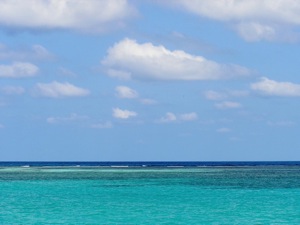
Fast forward, we’re getting the boat equipped to go cruising and we’re certified PADI divers with a few dive vacations behind us for experience. We decide to add an Airline dive system, one of those little lawn mower type engines that pumps air down 60 foot hoses so you don’t have to have tanks and an air compressor aboard to dive. It was huge and the only thing we ever used it for was cleaning the bottom, and even that maybe only twice. The two hoses were a PITA to untangle and once we got them untangled would just get tangled up again as soon as we got in the water. We sold the system to a huge catamaran in Bocas Del Toro and I’m sure they had much more fun with it than we did! 🙂
Before we sold it, we bought used dive tanks in Roatan, Bay Islands, Honduras and also took a PADI refresher course. It was easy getting the tanks filled at all the dive resorts and we actually did a bit of diving.
But, two years earlier while snorkeling in Belize, we’d met our good friends Doug & Rayene on sv Kristiana. They taught us to free-dive — well, they taught David and I was horrible at it, but got a bit better as the years went on. Doug also taught David to spearfish. Spearfishing is illegal with scuba gear, so every day when they went spearfishing, I went along with my underwater camera determined to take a photo of a species new to me. This game was so much fun – along with identifying the reef fish species when we returned to the boat – that we literally didn’t think to dive. We were in the water anywhere from an hour to four hours a day and having the time of our lives.
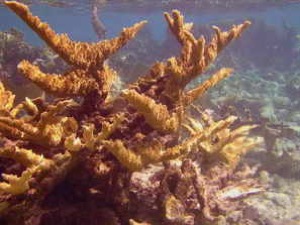
We brought a long hose and a dive tank adapter back to the boat during one of our summers at the lake – now we could hook it up to the dive tank and clean the bottom with the hose, not the tank. We do have full scuba gear onboard – BCD’s, weights, tanks etc., but our boat is far too small for a dive compressor.
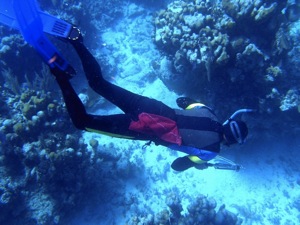
Snorkeling was entirely hassle free and both of us loved it. For the most part, the clear waters of Belize, the Bay Islands and the San Blas Islands in Panama were shallow, incredible reef, or reef wall snorkels. I know you can see more down 30-50 feet, but not enough more to motivate us to lug all our scuba stuff out, get it in the dinghy, take the time to gear up and actually scuba dive – not to mention lugging the tanks somewhere to get them refilled each day.
One memorable occasion, we were dinghy diving on the reef wall on the south side of Roatan, Bay Islands. Friends taught us that it was easier for me to get in the water and then put on my BCD and attached tank in the weightless environment, then David had all the room in the dinghy to rig up and roll off backward. It worked pretty well … except the time that when he turned to roll off backward into the water, something happened and he rolled off the dinghy seat backward into the bottom of the DINGHY! So here he lies, arms and legs flailing like an upside down bug. I’m in the water laughing so hard I’m crying and absolutely no help at all. The imagery of that day still makes me laugh out loud.
In the meantime, we found ourselves snorkeling for hours whenever we had the chance and literally never used the dive equipment. If we decided to scuba dive again – which isn’t completely out of the realm of possibility, we just had our tanks re-hydrostated so they’re legal again (they expired in 2010) in anticipation of exploring the Exumas/Bahamas, we’ll need to take another PADI refresher course, but that’s never a problem in a dive area.
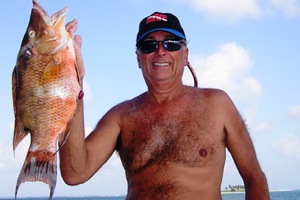
If we had it to do all over again, we’d probably do the same things, but we both love snorkeling and are still somewhat intimidated by diving, so there you have it. 🙂
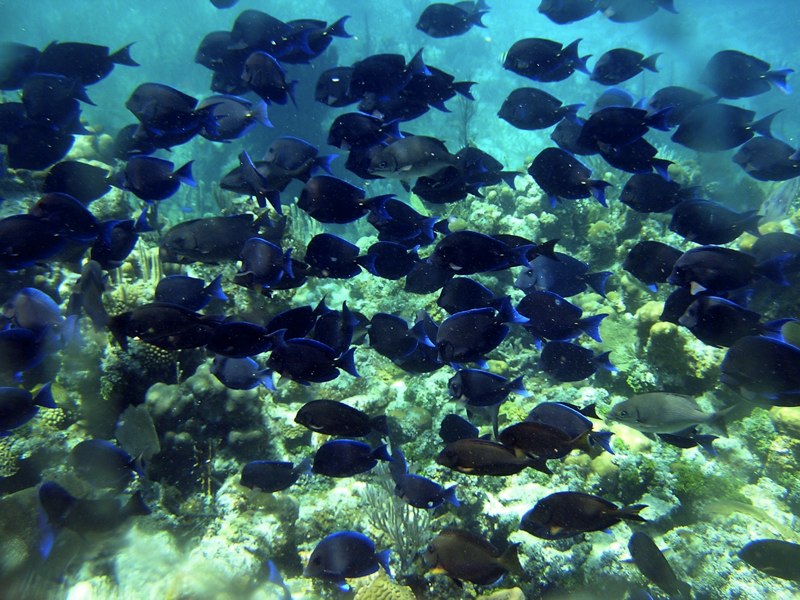

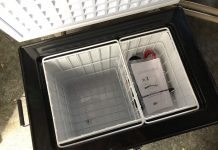
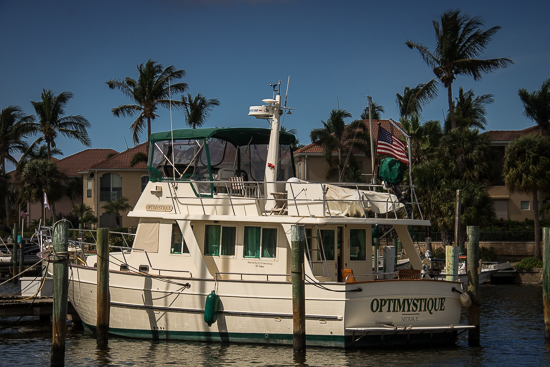







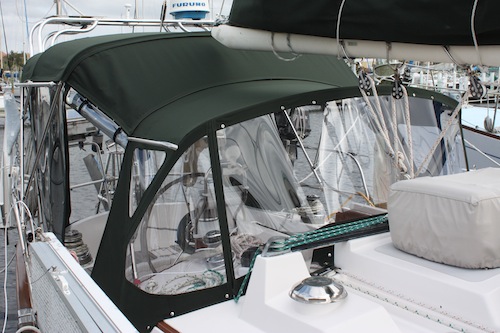


Sort of the same experience for us — although we DID love the Airline for cleaning the bottom and considered it essential (maybe because there were few dive fill places where we were cruising so using a tank wouldn’t have worked).
But over 6 years, we probably only did 3 or 4 “fun dives” apart from bottom cleaning . . . we discovered that snorkeling was the way to go! Lots less “stuff” in the dinghy, the reefs were close enough that we could see them from the surface and free dive for a closer look (there’s not a lot of light at depths below where we can free dive), prep and clean up are so fast . . . etc.
Wow! I’m always thrilled thinking of those colorful school of fish and what it feels like you’re stepping into a whole new world. Maybe then I guess it pays to have a scuba lesson and overcome my fear of submerging into the water.